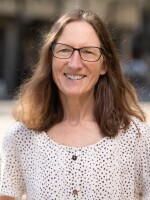Nearly 400,000 Oregonians were born in another country; about 115,000 are undocumented. As part of a monthly series on immigration, KLCC's Karen Richards set out to learn where we stand, finding that while global migration is in crisis, U.S. policy is static.
Although the *enforcement of immigration law is in flux, the underlying legislation hasn't changed in decades. Kristin Yarris is Assistant Professor of International Studies at the University of Oregon.
Yarris: “We haven't had major immigration reform in the United States since 1986. So it's been a long time.”
Under President Reagan, the Immigration Reform and Control Act legalized millions of undocumented workers. It also created penalties for hiring illegal immigrants, whose numbers have grown ever since.
The U.S. State Department lists more than 30 types of temporary visas. These include visits for medical procedures, tourism, or short-term jobs. Raquel Hecht is an immigration lawyer in Eugene. She says Oregon sees a lot of seasonal workers who plant trees:

Hecht: “They are highly protected. They need to be paid, I think the minimum right now is 16 or 17 dollars an hour. So you know, its a good wage. It's also very hard work. And so it's very hard to find Americans who are willing to do that work.”
Hecht says Oregon's 12,000 foreign students obtain visas through their institutions, and professors have priority visas.
There are far fewer ways to earn permanent, immigrant status. Broadly, they require being an employer-sponsored professional or the spouse of a U.S. citizen. Hecht says even then, there's no guarantee:
Hecht: “Even if you marry a U.S. citizen, that path might be quite difficult and you may not even qualify.”
For instance, she knows many locals who don't qualify because they've returned home for a funeral or other emergency.
Since 1868, under the 14th Amendment to the Constitution, being born in this country affords you citizenship. David Saez is Executive Director of Centro Latino Americano in Eugene:

Saez: “Many of the families that we serve have kind of mixed status. So that there's somebody within the family that is a citizen. And so that makes it all very complicated.”
Another wrinkle is that children who came to the U.S. before age 16 as of 2012 are given a reprieve from deportation through the Deferred Action for Childhood Arrivals or DACA program, for now. The Trump administration has threatened to change that.
Arriving as a refugee is a path to citizenship.
At World Refugee Day in Eugene, a marimba band performs. Meanwhile, people assemble supplies for U.N. camps, tour a model refugee tent and learn how they can help. Professor Yarris is here to explain who qualifies as a refugee:
Yarris: “The definition of a refugee is someone who is fleeing persecution on the grounds of some aspect of their group membership or identity and that could be religious or ethnic or racial.”

Yarris says the rule recently expanded to include persecution due to gender identity or climate-related violence. Applicants need to prove returning home would be a threat to their life. Christine Zeller-Powell is with the Refugee Resettlement Coalition of Lane County. She says they're authorized by the State Department to take in 35 people per year.
Zeller-Powell: “We have settled far fewer individuals than we had hoped. Part of that is due to the political situation. So we have had a family of four arrive, a family of Syrian refugees, and a single woman from Iran.”
Zeller-Powell says half of refugees are children, and they go through an extensive, two-year vetting process.
Without a visa or refugee status, coming to the U.S. is against the law. But, says El Centro's David Saez:
Saez: “I see all immigrants that are coming to our community as refugees. They're either humanitarian or they're economic refugees. They're here because what they had was not going to meet their needs.”
Under current law people without proper documents risk deportation. Attorney Raquel Hecht sometimes has to explain the hard facts. She says recently a man who's lived here 24 years asked her to start his citizenship paperwork. Because he came illegally, she couldn't:
Hecht: “He's like, 'This is ridiculous, I've paid my dues. I've raised my children I own my own home, I'm manager of a well-known company. I've been this good citizen all these years and you're telling me I've waited this whole time and I'm still not eligible?'”
Hecht says one of the biggest misunderstandings is why immigrants don't simply get in line and follow the rules to cross the border.
Hecht: “If they haven't left their country yet and they have no U.S. citizen spouse, generally there's no path for that. You can't just say I want to go work in the United States, you know, get me a visa.”
Hecht would love to see immigration reform. Professor Yarris agrees.
She says it's not about open borders, but rational change. For refugees:

Yarris: “I think people register, they pay a small amount, they file for legal residency and it's sort of an investment in the infrastructure that allows those petitions to be processed in a much more timely way so that we can imagine a system in which within 90 days people have a decision and could come.”
Yarris says waiting for years on end can lead people to enter illegally. And new realities blur the categories. Whether it's concepts like climate refugees or mixed status families, displacement is changing, and the rules remain the same.
Funding for KLCC's "Borders, Migration, and Belonging" series is provided by the Wayne Morse Center for Law and Politics at the University of Oregon.
Here's a link to an August, 2016 study on immigrants in Oregon.





